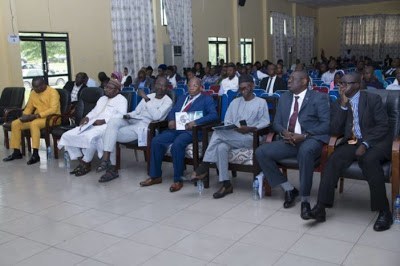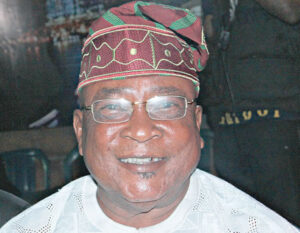
The National Space Research and Development Agency (NASRDA) on Tuesday said that Nigeria should harness the benefit of launching satellites from the Equatorial orbit which is shorter to space and saves cost.
Dr Spencer Onuh, the Director, Centre for Satellite Technology Development (CSTD), one of NASRDA’s activity centres, said this during the centre’s week and 9th Annual Space Conference and Exhibition in Abuja.
The News Agency of Nigeria (NAN) reports the two days conference focuses on the theme “Exploration of Equatorial Orbit for Space Optimisation.’
Onuh said that Nigeria located in Africa as a continent is advantaged being close to the equatorial orbit, adding that the positioning gives African countries an edge over other countries who could be located across the polar orbit.
NAN reports that Nigeria in 2003, 2007 and 2011 launched its satellites from China, Italy and Russia respectively which are outside the equatorial orbit.
Onuh explained that “equatorial orbit is an orbit roughly in line with the equator of the being planet orbited while polar orbit is one in which a satellite passes above or nearly above poles of the body being orbited on each revolution’’.
“There is a natural endowment of advantages the equatorial region bestows on us.
“For a country like Nigeria, we do a lot of revisiting of satellites for information gathering in disaster management, security, agricultural issues.
“We need to make use of equatorial orbit to reap the benefits of space science and technology,” he said.
According to Onuh, Nigeria is lacking in the area of infrastructure for developing space science technology but has human capacity to advance the sector.
He said that private-public partnership, space entrepreneurs can be encouraged to build the infrastructure needed to develop space science technology and harness its benefits.
“Private partnership can be Nigeria having international collaborations that should be done in our interest, on our terms.
“We have the capacity to challenge European space industry, our challenge is the infrastructure, we need to fix our ground station, our Assembly, Integration and Testing lab.
“Private-public-partnership can be encouraged to develop space science technology because satellite business is not just about government,” Onuh said.
The director said, though, the government had taken the responsibility of developing the space industry because Nigeria is a third world country but it is not sustainable.
Prof. Babatunde Rabiu, Director, Centre for Atmospheric Research, said that satellites from equatorial orbit deviate from the equitorial plane of a planet by less than 45 degrees.
According to Rabiu, equatorial region is characterised with the highest values of the peak electron density with the most pronounced amplitude.
He said that Near Equitorial Orbit (NEqO) satellite of countries have the potential to provide immediate disaster relief information and repetitive monitoring from multi-mission satellites.
“NEqO satellites have possible programming and selection of areas to be observed with acceptable cloud cover before and during satellite data acquisition,’’ he said.
He noted that NEqO country satellites have less market potential for data coverage because it is limited to targeted zone in equitorial zone.
“I observed that most of the nations in the equatorial belt are actually underdeveloped and considered as nations with poor management of resources,” he said
The director recommended that there should be continuous deployment of ground-based equipment for monitoring space environment in the equatorial region.
He called for urgent review of the space agency’s present budget and procurement laws to favour space science and technology among other recommendations.
Dr Matthew Adepoju, President, Geo-information Society of Nigeria (GSN) said African countries lagged behind in the first, second and third industrial revolution.
Adepoju noted that the continent must not continue to take the back stage in the fourth industrial revolution.
“The most advanced countries have taken advantage of the polar orbit, we are located in the equatorial orbit which we need to take advantage of.
“Most African countries are leveraging on this and Nigeria need to also key in and take our leadership in the continent to space. (NAN)
You may be interested

2024 CHANQ: History Not Kind To Us Against Ghana –Ogunmodede
Webby - December 24, 2024Home-based Super Eagles coach Daniel Ogunmodede says history has not been good to Nigeria when they face rivals Ghana.The home-based…

Ex-Chelsea Star Oscar Returns To Boyhood Club Sao Paulo
Webby - December 24, 2024Former Chelsea midfielder Oscar is returning to his Brazilian boyhood club Sao Paulo after 14 years, which included a long…

‘I’m Incredibly Proud’– Arokodare Talks Up Genk’s Unbeaten Home Streak
Webby - December 23, 2024Tolu Arokodare is full of excitement followingGenk’s historic victory over Anderlecht, reports Completesports.com.Sunday’s win at the Cegeka Arena was the…


![VeryDarkMan Accuses Reno Omokri Of Allegedly Suppressing Brother’s Rαpe Case [Video]](https://onlinenigeria.com/wp-content/uploads/2024/04/verydarkman-accuses-reno-omokri-of-allegedly-suppressing-brothers-rceb1pe-case-video-300x157.jpg)
![Confusion As May D And Uche Maduagwu Engage In Physical Fight Publicly [Video]](https://onlinenigeria.com/wp-content/uploads/2024/04/confusion-as-may-d-and-uche-maduagwu-engage-in-physical-fight-publicly-video-300x150.jpg)


















![American Pastor, David Wilson Seen Eating The Box Of Woman Who Isn’t His Wife [Video]](https://onlinenigeria.com/wp-content/uploads/2019/10/american-pastor-david-wilson-seen-eating-the-box-of-woman-who-isnt-his-wife-video-150x150.jpg)









